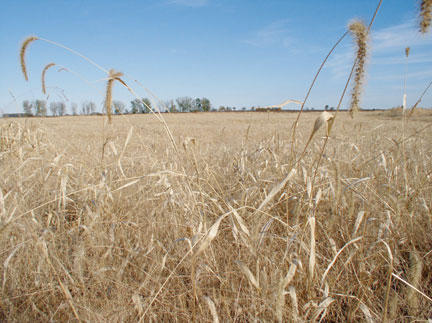A Cascade of Lightby J.D. Phillips |
| Printer-friendly version | Email this article |
|
"What gives value to travel is fear . . ." Thick, luxuriant woods grew round the cave, alders and black poplars, pungent cypress, too, and there birds roosted, folding their long wings, owls and hawks and the spread-beaked ravens of the sea, black skimmers who make their living off the waves. And round the mouth of the cavern trailed a vine laden with clusters, bursting with ripe grapes. Four springs in a row, bubbling clear and cold, running side-by-side, took channels left and right. Soft meadows spreading round were starred with violets, lush with beds of parsley. Why, even a deathless god who came upon that place would gaze in wonder, heart entranced with pleasure. -The Odyssey, Homer
There is a field north of town, 88 acres of unfarmable fen, a small island of grasses, a few of them native, defiant in a sea of corn, soybeans, roads, and farms. The local farmers call it The Burn. It teems with wildlife. In winter a few short-eared owls take refuge here. Late in the afternoon after a fresh snowfall, the low December sun shines up at them from below as they arc above me and light up the soft chestnut tones in their primary feathers. I stand in the cold stillness and breathe in the raw, bracing air; the owls float above the field, ethereal, moth-like, silent. I tremble under the weight of the beauty. The wind picks up; the owls' wings stiffen and bow. They ride more buoyantly now above the snow, like shearwaters over the open ocean, and I'm back in Ecuador, in a dinghy off of Puerto Lopez, on the sun-drenched Pacific. There are shearwaters now, off the stern, and storm-petrels and boobies and frigatebirds and pelicans and humpback whales. And we are lost in them, and in the swells and spray, and in the sun and wind, adrift on the Pacific. And it occurs to me that some of us might eventually learn to live less profanely. We moor off of Isla de la Plata, an island refuge, looking for sanctuary among the colonies of blue-footed boobies, red-tailed tropicbirds, Nazca boobies, magnificent frigatebirds, and even a few red-footed boobies. Tens of thousands of outlandish, wild, pelagic birds. And us. And the salty taste of the Pacific in the air. And the sweltering tropical sun on our backs. And the rich smell of guano and sea. And the beauty of things. And the sadness, too, because we can see our wounds and imperfections and the ugly tyrannical ambitions of our own souls, in comparison with the beautiful which is untainted by all of this. And the beautiful seems fragile and rare compared to the crudity and banality of what is common (this same sadness runs through love). And so we are on this island, this sanctuary, as an awkward but sacramental act of self-purification. In a cloud forest now, after a day of difficult hiking and a night of primitive camping: the boxed-in feeling of unsatisfied hunger and unquenched thirst; the dull fear of illness that never quite leaves you in the tropics; and the assertive revealing-new to the students, young and in the pink of health as they are-of the indignity of the "Thousand natural shocks/that flesh is heir to." We have bodies; a hard lesson. My students are porous. I am porous. Here is Camus: "What gives value to travel is fear. It is the fact that, at a certain moment, when we are so far from our own country . . . we are seized by a vague fear, and an instinctive desire to go back to the protection of old habits. At that moment we are feverish but also porous, so that the slightest touch makes us quiver to the depths of our being. We come across a cascade of light, and there is eternity." There is eternity. Making our way together, as a group, gracefully, through the hostile landscape of fear and hunger and headstrong desires. Finding our way together, as a group, through unfamiliar woods and bewildering taxonomies. Quetzals, trogons, toucans, tapaculos, mountain-tanagers, manakins, motmots, white-starts, sylphs, violetears. To touch the beauty of things. The tonic for hardships endured and fears stared-down. Grace, even forgiveness. A cascade of light. Sanctuary. I am alone now and descending through the thin, pious air and freezing rain of Vulcan Cayambe, the highest point on the earth's equator. Soon I am with the strange seedeaters, pipits, flowerpiercers, sunbeams, raptors, brush-finches, sierra-finches, and ground-tyrants of Cayambe's paramos. And now, lower still, I enter the cloud forest, the wet, lusty embrace of this trembling refuge. A tiny bird emerges from the canopy above me, a Blackburnian warbler, an old friend from the Indiana spring, picking insects from the leaves here in the sanctuary of its wintering grounds. And I decide to feel certain that this is the same bird who sang to me last spring from the top of a giant hackberry tree on the border of The Burn, my sanctuary, covered in snow now, the warbler's song a memory, echoed in the silence of the owls arcing above the winter field. J.D. Phillips is professor of mathematics and chair of the Wabash math department. Last summer in Ecuador he taught "Science as a Way of Knowing" in the College's Ecuadorian Studies Program. Contact Professor Phillips at phillipj@wabash.edu
|

